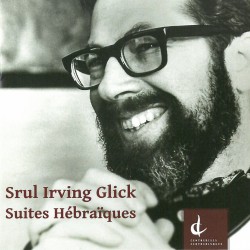 Srul Irving Glick – Suites Hébraïques
Srul Irving Glick – Suites Hébraïques
James Campbell; Angela Park; Elissa Lee; Sharon Wei; Cameron Crozman; Barry Shiffman; Wallace Halladay; Susan Hoeppner
Centrediscs CMCCD 24817 (musiccentre.ca)
Srul Irving Glick (1934-2002) composed six Suites Hébraïques between 1961 and 1984, each a multi-movement work ranging between ten and 20 minutes in length. Three are written for solo instrument with piano accompaniment, and three for a variety of chamber ensembles. This release is the first to compile them all under one cover, and features some of Canada’s finest instrumental performers.
Modest in means and range, the pieces are nonetheless pure expressions of the composer’s love for Jewish traditional melodies, harmonies and forms. Not one movement exceeds six minutes, while most are much shorter. Glick didn’t write them to claim a place atop Parnassus, but rather to celebrate the music he heard and loved growing up the son of a cantor, singing in his father’s choir and at home. For that reason, pay particular note to Suite No.4, for saxophone and piano, played (sung) by Wallace Halladay with Angela Park on piano. Also on the second disc is the final suite, played by violinist Barry Shiffman with Park again at the piano. Both soloists perfectly express the singing quality called for in Glick’s music. Park took on the lion’s share of playing on this recording. She performs beautifully in four of the six suites.
Because they are based in the traditional forms, there is a repetitiveness to the titles: Circle Dance occurs in five and Cantorial Chant in four of the six suites; other titles, such as Nigun and Hora, variously find their way into several of them. It’s not a stretch to compare this to the work of Baroque composers, who also explored forms repeatedly in dance suites. However, nowhere does the music repeat itself. In fact, Glick seems to have been one of those composers for whom there was little effort in devising new material. In the jacket note Dorothy Sandler-Glick is quoted thus: “The melodies came easily as if they were waiting for him to lift them out of his soul.” So they sound.



